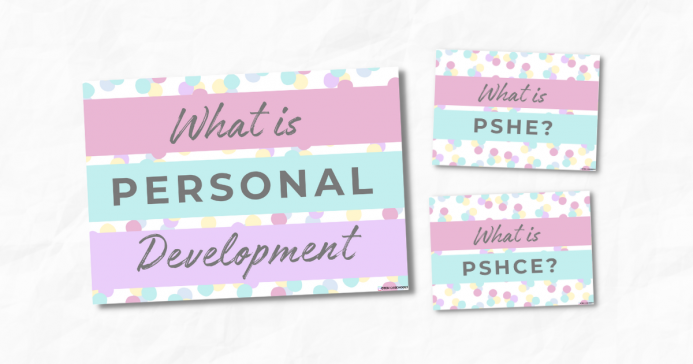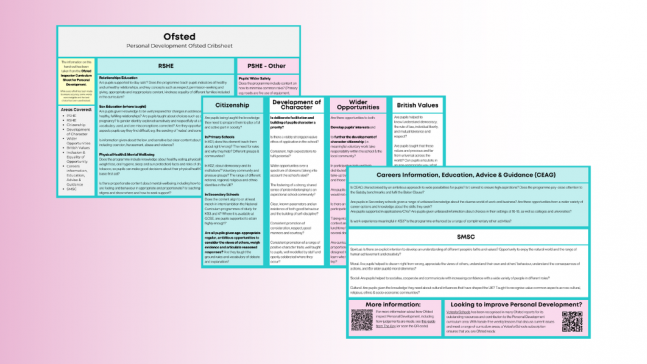It’s not your imagination. Since 2018, the Personal, Social, Health & Economic (PSHE) curriculum has grown beyond recognition. From headline-grabbing changes like the introduction of the statutory RSE curriculum to subtler shifts such as Ofsted’s umbrella term ‘Personal Development,’ teachers, especially those leading PSHE, may find navigating these updates challenging. Just when you think you’ve got your curriculum covered, a few more additions are made. With this blog we intend to outline PSHE specifically, providing you with a clear understanding of its components and how to effectively implement it in your school.
What is PSHE?
PSHE stands for Personal, Social, Health and Economic wellbeing and careers - the four components that make up this broad curriculum area. It is a non-statutory subject as the Government believes that teachers are the experts in knowing what aspects of PSHE their pupils need to know which can be a blessing or a curse for some teachers.
Some schools also call it PSHCE (Personal, Social, Health and Citizenship Education), Life Skills, Social Studies and PAL (Preparation for Adult Life). Whatever the name, the content is based around preparing pupils for life both inside and outside of school.
PSHE education is more than just a curriculum requirement; it's the cornerstone of nurturing well-rounded, informed, and resilient young people. This curriculum covers essential topics like mental health, physical health, relationships, online safety, and financial education, providing a comprehensive approach to personal development.
PSHE in Primary Schools
In primary schools, PSHE education lays the foundation for pupils' personal development. It helps children understand and manage their emotions, establish healthy relationships, and learn about staying safe. Key stage 1 and 2 pupils are taught about:
- Health and Wellbeing: Basic hygiene, physical health, and emotional wellbeing.
- Relationships: Understanding friendships, family dynamics, and dealing with conflicts.
- Living in the Wider World: Basic financial education, online safety, and understanding the world around them.
The goal is to ensure that young pupils develop a positive self-image and learn essential social skills that will benefit them throughout their lives.
PSHE in Secondary Schools
At the secondary level, PSHE education builds on the foundations laid in primary school. It addresses more complex and sensitive issues, preparing students for adulthood. Key stage 3 and 4 students explore topics such as:
- Health and Wellbeing: Mental health awareness, sexual health, and substance abuse.
- Relationships: Healthy relationships, consent, and dealing with peer pressure.
- Living in the Wider World: Career guidance, financial capability, and digital literacy.
Secondary PSHE aims to equip students with the skills they need to navigate the challenges of adolescence and beyond, ensuring they are well-prepared for their future careers and adult lives.
PSHE Resources & Schemes of Work: How to Plan Your PSHE Curriculum
Planning a robust PSHE curriculum requires careful consideration of your pupils' needs and the statutory requirements. Here are some steps to help you plan:
- Assess Needs: Use surveys, discussions, and assessments to understand the specific needs of your students.
- Set Objectives: Define what you want to achieve with your PSHE programme. This could include improving mental health awareness or teaching financial literacy.
- Choose Resources: There are many quality resources available, such as the PSHE Association's schemes of work, VotesforSchools resources, and various online tools and countless free resources you can adapt to your setting.
- Create a Scheme of Work: Outline what will be taught each term, ensuring a balance of topics across health, relationships, and the wider world.
- Engage Staff: Provide training and support for teachers to deliver PSHE effectively.
PSHE Curriculum Overview
The PSHE curriculum is designed to equip students with essential knowledge, skills, and attributes necessary for managing their lives. It is organised into three core themes: Health and Wellbeing, Relationships, and Living in the Wider World, and covers Key Stages 1 to 5.
Key Stage 1-2
At Key Stages 1 and 2, the curriculum focuses on developing pupils' independence, social awareness, and personal responsibility.
| Core Theme | Sub-theme | Learning Opportunities |
|---|---|---|
| Health and Wellbeing | Healthy lifestyles | About keeping healthy, food choices, physical activity, sleep, hygiene routines, medicines, dental care, sun safety. |
| Mental health | Recognising feelings, strategies for positive mental health. | |
| Keeping safe | Safety rules, managing risks, safe use of medicines, emergency procedures, safety online. | |
| Relationships | Families and people | Importance of families, characteristics of healthy family life, respecting differences. |
| Caring friendships | Characteristics of friendships, managing conflicts, recognising who to trust. | |
| Respectful relationships | Respecting others, importance of kindness, recognising and challenging stereotypes. | |
| Living in the Wider World | Community and careers | Jobs in the community, aspirations, understanding money, and basic financial concepts. |
| Media literacy and digital resilience | Safe and responsible use of technology, recognising risks, critical thinking about media. |
Key Stage 3-4
For Key Stages 3 and 4, the curriculum builds on prior learning, addressing changes during adolescence and preparing students for adult life.
| Core Theme | Sub-theme | Learning Opportunities |
|---|---|---|
| Health and Wellbeing | Self-concept | Understanding personal strengths, building self-esteem, body image, managing influences. |
| Mental health | Identifying emotions, managing mental health, challenging stigma, developing coping strategies. | |
| Healthy lifestyles | Importance of balanced diet, physical activity, managing stress, understanding sexual health. | |
| Relationships | Families and parenting | Understanding different family structures, importance of stable relationships, managing family conflicts. |
| Friendships and relationships | Characteristics of positive relationships, consent, addressing unhealthy relationships, handling peer pressure. | |
| Intimate and sexual relationships | Understanding consent, sexual health, managing intimate relationships. | |
| Living in the Wider World | Economic wellbeing and financial capability | Understanding employment rights, budgeting, managing money, understanding the impact of financial decisions. |
| Media literacy and digital resilience | Navigating online information, understanding digital footprints, recognising online risks. |
Key Stage 5
At Key Stage 5, the focus shifts towards preparing students for independent living and future career or educational opportunities.
| Core Theme | Sub-theme | Learning Opportunities |
|---|---|---|
| Health and Wellbeing | Self-concept | Managing life transitions, understanding body image issues, considering body enhancement consequences. |
| Mental health | Recognising changes in mental health, strategies for positive mental health, managing stress and anxiety. | |
| Healthy lifestyles | Personal health monitoring, accessing health services, maintaining a healthy diet and work-life balance. | |
| Relationships | Families and parenting | Managing changing family dynamics, understanding parenting responsibilities, handling family conflicts. |
| Friendships and relationships | Maintaining positive relationships, understanding the impact of digital technology on relationships. | |
| Intimate and sexual relationships | Comprehensive sexual health education, managing intimate relationships responsibly. | |
| Living in the Wider World | Economic wellbeing and financial capability | Planning for financial independence, understanding taxation and pensions, evaluating savings and investment options. |
| Media literacy and digital resilience | Building a positive online presence, critical evaluation of digital content, managing online reputation. |
Showcasing Learning and Progress in PSHE (assessment)
Demonstrating progress in PSHE can be challenging, as it often involves personal and social development rather than traditional academic achievement. Here are some strategies:
- Portfolios: Students can create portfolios that include reflections, project work, and examples of their learning.
- Surveys and Feedback: Regular surveys can capture students' changing attitudes and understanding of PSHE topics.
- Class Discussions: Observations from class discussions can provide insight into students' progress and engagement.
PSHE Displays: Protected Characteristics, Personal Development, and More

Creating vibrant and informative PSHE displays in your school can reinforce learning and celebrate diversity. Consider including:
- Protected Characteristics: Display information about the Equality Act 2010 and the nine protected characteristics to promote inclusivity.
- Personal Development: Highlight student achievements and positive behaviours.
- Topical Issues: Use displays to address current issues such as mental health awareness days, anti-bullying week, or internet safety campaigns.
Ofsted & PSHE: What are Ofsted Looking for with Personal Development?

Ofsted places significant importance on personal development in their inspections. They are looking for schools to provide:
- A Broad Curriculum: PSHE should cover a range of topics that contribute to students' personal development.
- Evidence of Impact: Schools need to show how PSHE lessons are making a positive difference in students' lives.
- Inclusive Environment: Inspectors will look at how schools promote equality and celebrate diversity.
- Student Wellbeing: Schools should have robust systems in place to support student wellbeing, including mental health support and safeguarding measures.
If you want to find out more about what Ofsted are looking for with personal development read our in-depth blog here.
What a PSHE subject leader needs to know
Now we’ve given the basics, we want to go into more detail for those of you lucky enough to have become PSHE subject leaders.
Congratulations! You’re leading a subject full of topics every adult now wishes they’d learned at school. This subject serves young people, so check if your current provision is up to date, relevant, and engaging for your pupils. The beauty of PSHE is that it isn’t formally assessed, but you still need to know what your students want from it and what they need.
This is a fantastic opportunity for you
Many people feel daunted by PSHE leadership, especially if they’ve never studied PSHE, RSE, or related subjects. However, you’re leading a subject every student will learn. You’ll work with several staff members, forming strong working relationships within your school. You’ll also collaborate with external agencies for workshops and events. PSHE is a significant part of Personal Development, a key Ofsted category. This is a great chance to gain transferable leadership skills while making a difference to your students.
PSHE can feel challenging for your peers
Whichever setting you are in, fitting enough PSHE in is a challenge. With overcrowded timetables and tricky topics, it is important to understand that your fellow teachers are doing their best. Help them out by streamlining resources, cutting down unnecessary paperwork, and supporting them with challenging curriculum aspects or topical issues. Each phase has specific priorities, so work with small groups rather than everyone at once. Keep a simple log of what has been covered to ensure accountability and track key objectives throughout the year.
PSHE education is a vital part of the curriculum, helping to shape well-rounded, informed, and resilient young people. By carefully planning your PSHE curriculum, using engaging resources, and demonstrating progress, you can ensure that your students benefit fully from this essential subject. Don't forget to sign up for a 14-day free trial with VotesforSchools to access a wealth of resources and support for your PSHE programme!


